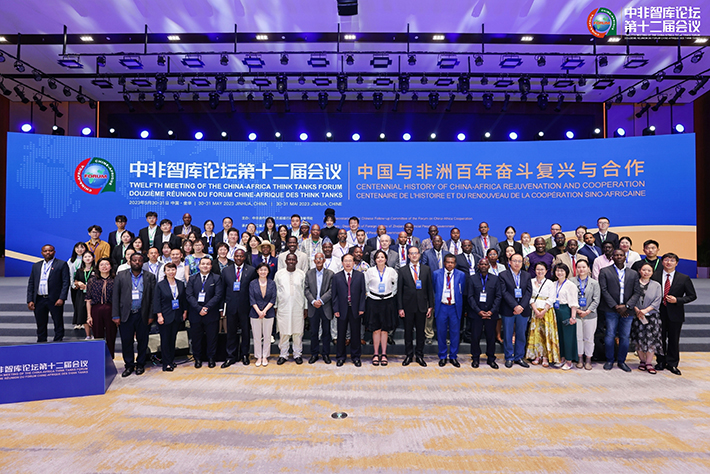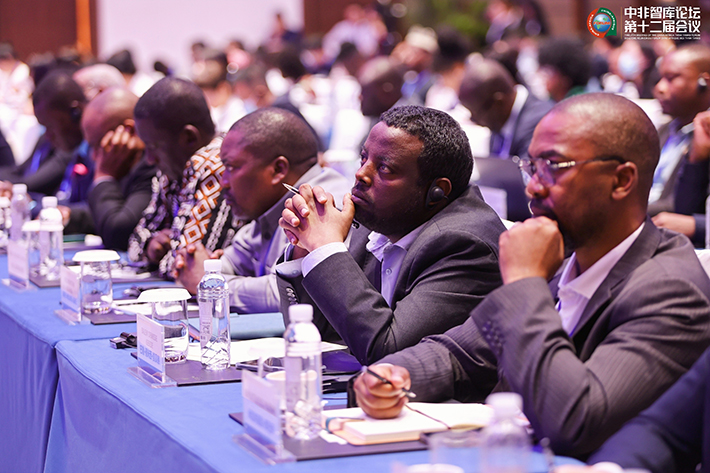|
||||||||||
| Home Nation World Business Opinion Lifestyle ChinAfrica Multimedia Columnists Documents Special Reports |
|
||||||||||
| Home Nation World Business Opinion Lifestyle ChinAfrica Multimedia Columnists Documents Special Reports |
| ChinAfrica |
| A Meeting of Brilliant Minds |
| Think tanks forum puts forward ideas for further strengthening China-Africa friendship |
| By Hu Fan | Web Exclusive ·2023-06-01 |

Attendees of the 12th Meeting of the China-Africa Think Tanks Forum pose for a group photo in Jinhua, Zhejiang Province, on 31 May (Courtesy)
Over 400 attendees including officials and scholars from China and Africa participated in the 12th Meeting of the China-Africa Think Tanks Forum held in Jinhua, Zhejiang Province in east China, on 30-31 May.
Pierre Gomez, minister of higher education, research, science and technology of Gambia, who had previously attended a seminar on higher education management held by Zhejiang Normal University based in the city, returned to discuss how Gambia has been transforming its education system. He suggested to reinforce cooperation in this regard. In particular, he expressed his wish to learn more about China’s experience in cultivating policymakers and administrators at the forum.
“China’s civil servant training [began] many years ago, so we are sure there are best practices that you can share with me,” he said.
Education was one of the wide arrays of topics discussed at the forum. Founded in 2011 by Zhejiang Normal University, the forum has served as an important platform under the framework of the Forum on China-Africa Cooperation for exchanges between Chinese and African academic institutions and think tanks.
Renewing friendship
With the theme of “Centennial History of China-Africa Rejuvenation and Cooperation,” the forum laid great emphasis on reviewing the history of China-Africa friendship.
“China started trading with northeast Africa before the Christian era,” said Kgalema Petrus Motlanthe, former president of South Africa, via video link, quoting from a book titled China-Africa and an Economic Transformation edited by Arkebe Oqubay and Justin Yifu Lin.
He said that there are many areas where China and Africa can learn from each other. In particular, he said that China’s path of economic development has provided valuable experience for Africa to learn from. “When the People’s Republic of China was founded in 1949, even South Africa and Egypt had a stronger economy than China. But by the 1990s, China had formed huge political and economic advantages,” Wang said.
He lauded the Belt and Road Initiative, calling it an exemplary programme for Africa’s independent development that can increase Africa’s capacity, reduce the prevalence of poverty and deepen China-Africa cooperation.
Charles Onunaiju, director of the Centre for China Studies of Nigeria, attributed the great progress of China-Africa relations to the strong support of generations of Chinese leaders, from the delegation to Africa led by then Chinese Premiere Zhou Enlai to the global initiatives proposed by Chinese President Xi Jinping. He believed the cordial political relations have laid a solid foundation for China-Africa cooperation.
“As you may know, President Xi has launched China-Africa comprehensive strategic and cooperative partnership, which means our cooperation has no limit and we can expand,” he told ChinAfrica.
The forum also lauded the achievement of China-Africa cooperation at the local level, in Jinhua in particular. In 2022, Jinhua’s exports to Africa reached 87.94 billion yuan ($12.37 billion), accounting for over 8 percent of the national total for the eighth consecutive year, said Xing Zhihong, mayor of Jinhua.
According to him, Jinhua is home to over 5,000 businesspeople from Africa, and over 700 African-invested businesses and trade agencies have registered in the city. In terms of education, the Institute of African Studies of Zhejiang Normal University based in the city have provided training for over 4,000 high-level African talents, and Jinhua Polytechnic’s partnership in Rwanda has trained over 5,000 locals.

Participants attend the opening ceremony of the 12th Meeting of the China-Africa Think Tanks Forum in Jinhua, Zhejiang Province, on 30 May (Courtesy)
Seeking solutions
While lauding the great achievements in China-Africa cooperation in the past years, experts attending the forum also acknowledged that there are areas where more can be done, and offered their solutions.
Wang Wen, executive dean of the Chongyang Institute for Financial Studies of the Renmin University of China, noted that the common missions yet to be accomplished by China and Africa include freedom from oppression of hegemony, fighting poverty, pollution prevention, anti-corruption, controlling crises including financial crises and social disorder and opposition of war.
He said China and Africa should continue to learn about each other, trust and help each other, and forge closer bonds for mutual benefit. He also emphasised that both sides should be tolerant of each other’s shortcomings in situations of frictions.
“I believe these frictions are just occasional incidents in the big picture of China-Africa cooperation. Opinion leaders on both sides should speak up and lead the partnership towards its broader targets,” he said.
Motlanthe also highlighted the pressure Africa faces in terms of poverty reduction, saying that although it has been a common goal of all developing countries since the end of World War II, the results are different for them, with countries like China achieving the target, while others including African countries still under the pressure of poverty reduction.
He called for further enhancing the ongoing cooperation on poverty reduction between China and Africa. “China is a unique example of how the power of a nation’s will can improve the lives of its people,” he said.
Africa’s debt problem, including the so-called “debt trap,” was also discussed at the forum. Ehizuelen Michael Mitchell Omoruyi, executive director of the Centre for Nigerian Studies, Institute of African Studies at Zhejiang Normal University, said that instead of “debt trap,” the focus of attention should be on other traps in Africa.
“We should be looking at the trap of poverty, the trap of underdevelopment, and the trap of lack of infrastructure, and these are the traps that China is trying to solve,” he told ChinAfrica, adding that instead of “trapping Africa with debt,” China has been introducing creative ways to tackle the debt problem such as the build-operate-transfer approach and public-private partnership in joint infrastructure projects.
Wide consensus was also reached at the forum about the importance of industrialisation for Africa and China-Africa cooperation. Mentioning the disadvantages African countries have compared to their European counterparts in the coffee industrial chain as an example, Gerald Mbanda, Rwandan researcher and publisher of news portal China-Africa Review, said that China’s support on industrialisation can help Africa to eliminate such disadvantages and improve the lives of African people.
“The Western countries want to make Africa a source of materials, but this is wrong. We should also be manufacturing, so that we gain value addition from materials,” he told ChinAfrica.
Other topics covered at the forum included the integration of Africa, business environment in Africa, investment in Africa, digital economy, exchanges between political parties, and the role of media. The attendees regarded the meeting as fruitful and inspiring. When summarising one of the sub-forums, Omoruyi said the words experts uttered came from the heart, and the ideas they shared are inspiring.
“They make me believe that China and Africa are not powerless. Let’s join hands and make the partnership stronger,” he said.
|
||||||||||||
| About Us | Contact Us | Advertise with Us | Subscribe |
| Copyright Beijing Review All rights reserved 京ICP备08005356号-5 京公网安备110102005860号 |